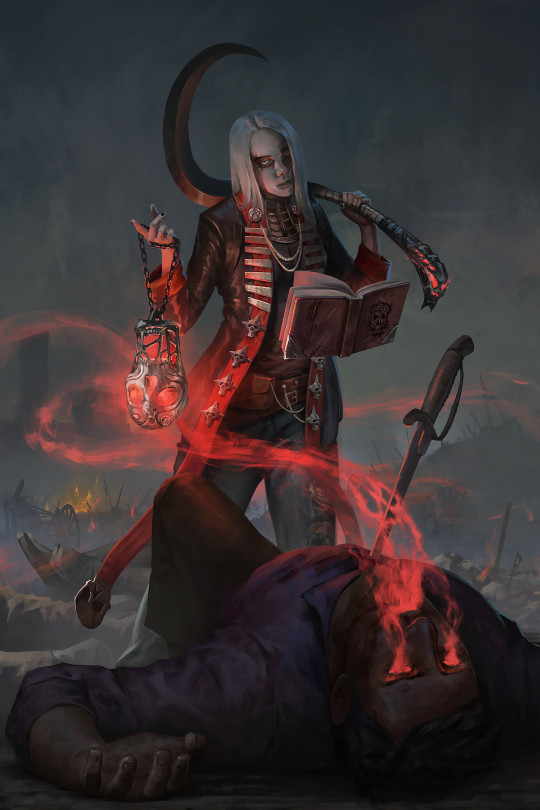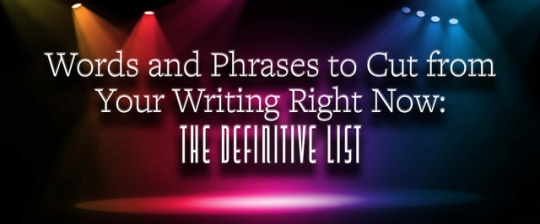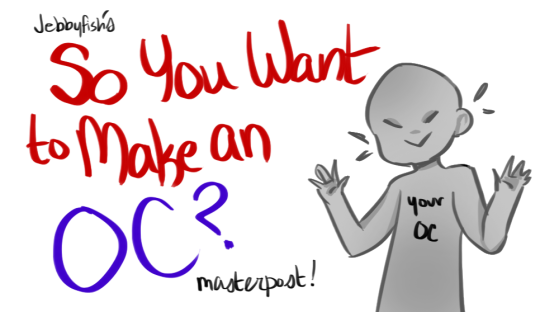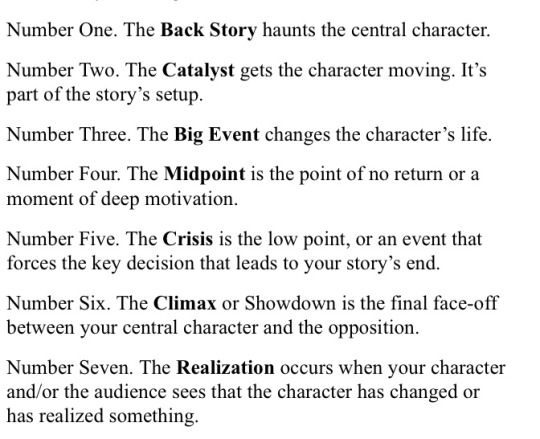my side blog for stuff to help me write and to yell about my current fanfic ideas
Don't wanna be here? Send us removal request.
Photo

Villain: Dematoth, the Devil of No-Man’s Land
“‘Listen Crowbait, you’ve got two choices. Me, or bearing those wounds of yours for a lingering eternity, until that pain and the aftertaste of sepsis are all that’s left of you. Plenty of other sundered souls on this battlefield who’d jump at my offer, so… what’s it going to be?
War profiteers come in all shapes and sizes, and even after the fighting’s done there’s still opportunity to be found. While the victors look for survivors to slay or ransom and the corpsepickers hunt for rings and baubles, Dematoth moves among the spirits of the fallen looking for those pained, desperate, and willing to make a deal. Is a century of service worth sparing yourself the pain of a wound that will not fade? or what about a personal escort to a cushy part of the underworld in exchange for a secret that could ruin the lives you’ve left behind? The devil knows how to drive a hard bargain but she seldom needs to, the bodies are always piling up somewhere and a new sucker dies every minute.
Sour and Sullen, the devil of no-man’s land cares little for the morality games of her kin, considering most mortals to be a means to an end at best and a waste of her time at worst. While the party might stumble across Dematoth out reaping fresh souls after a battle, she’s more likely to act as an unseen arms dealer among the forces of evil, offloading battalions of revanants and cursed objects to would be diabolists and greater fiends in exchange for various favours. In this way, the party can end up fighting a gang of early-game bandits only to be met with an unexpected postmortem rematch.
Hooks:
For the last few years Dematoth has been following a bloody band of mercenaries, adding fallen sadists and victims to her horde of stolen souls as the sellswords grow rich off of their contracts. This easy arrangement is due to be interrupted when the mercenaries get contracted out by another minor villain to act as muscle for a looming confrontation with the party, motivating the usually indolent devil to start getting proactive. While the heroes may have thought they were only fighting mundane threat, they’ll soon find themselves dealing with curses and other malevolent phenomenon alongside the ruthless mercs and petty despot they thought they were originally facing.
Following a number of otherworldy signs and nightmarish attacks, the party eventually realize they’re on the trail of a rampaging demon that arose from the soul of a famously wicked warrior. Tracking the entity back to the defiled tomb of its greatest foe, the party encounter Dematoth stalking the hallways on a hunt of her own. As the Devil of Noman’s land explains it, this isn’t a ghost that can be put to rest with silver and emotional catharsis, their quarry can only be bound, an art that far outstrips the party’s current skill. If they’re smart they’ll make an alliance with her, distracting and weakening the demon while she does her thing and stuffs it in her ominous skull lantern. Can the party believe her? or is there a better means of dealing with this infernal threat?
In peacetime, Dematoth likes to engineer little accidents where brave individuals get themselves killed due to their own foolhardy actions, appearing in various guises to point the avricious and the adventurous towards a sudden end. After her mark is dead, she appears, claiming to be a psychopomp who guides the courageous to their appointed afterlife after they’ve unburnded themselves of earthly regrets. This racket is an excuse to get the departed to agree to one of her deals or cough up some valuable information before the real spirit guides arrive, and can provide a delightful post-death hook for those heroes who fall in combat.
342 notes
·
View notes
Photo

So, so many works I’ve read could be vastly improved with tightening and shaving of superfluous words. Wordiness is an easy stumbling block, as we’re used to how we talk. We’re used to how others (long ago) wrote. But times change, my friend, and so do expectations of the writer. We don’t get paid by the word in fiction. So show your smarts and say as much as you can with as much power as you can in as few words as possible.
Here are a few things you can cut without reserve to help shorten your story right now. And as you catch yourself using these words in your next draft, hit that backspace before you finish the sentence! It’s okay if you already have. You can go delete them now. No one will ever know.

Moment/Second/Minute
It’s so tempting. I am guilty of using this word like fertilizer in my first drafts. But most of the time, these words aren’t needed at all. They add nothing.
He sat down for a moment, sipping his coffee. vs. He sat down and sipped at his coffee.
But he only did it for a moment, you say!
He sat down for a moment, sipping his coffee. When the door opened a second later, he shot to his feet. vs. He sat down and sipped his coffee. The door opened, and before he could swallow his first sip, he shot to his feet.
I know, this is about making your writing more concise and my “right” example has more words than the first example. But what’s the difference? The words used in the second sentence are more tangible. They give a visual that “a second later” and “for a moment” don’t. And you could leave that part out, of course, if you’re really going for trimming word count. It doesn’t paint quite the same image, but “The door opened and he shot to his feet.” is a perfectly good sentence.
Suddenly/All of a sudden
You’ve heard this one, before, surely. These words are used…when? When you’re trying to portray suddenness. Surprise, perhaps. So why are you adding in extra words to slow down the pace?
She flipped on the TV and reclined in her chair. All of sudden, the TV flashed a bright light and the power went out. vs. She flipped on the TV and reclined in her chair. The TV flashed once before the lights went dark. The power was out.
That sense of immediacy is felt when stuff just happens. So let it happen. If it’s rhythm you’re worried about, then find more useful words to create the rhythm. Notice that I didn’t just cut “All of a sudden” out of the sentence and leave it. I reworded it a bit to make it stronger.
Finally
It can be a useful word, but more often than not, it’s just taking up space.
Really/Very
Just…delete them.
To alter a Mark Twain quote:
“Substitute ’[fucking]’ every time you’re inclined to write ‘very;’ your editor will delete it and the writing will be just as it should be.”
But seriously, if you’re saying, “She was breathing very hard.” You could just cut the “very” and say, “She was breathing hard.” Or, even better, “She was panting.” Or, EVEN BETTER: “She panted.”
Himself/herself/myself/themselves
Reflexive nouns have a specific purpose, though they can still often be avoided. They fall into the category of “use only when it’s confusing otherwise.”
Correct: He looked at himself in the mirror. Better: He looked in the mirror.
Incorrect: She gave them to Andrew and myself before leaving. Correct: She gave them to Andrew and me before leaving.
Technically correct I guess: I haven’t eaten lunch myself. (Intensive pronoun; aka waste of words) Better: I haven’t eaten lunch.
Intensive pronouns add emphasis, but that emphasis is negligible and often negated by the power of tightening your narrative.
That
You can likely cut 60% of your “that"s and your story will be unaffected. Sometimes, you do need to add a “that” here and there for clarification, but not always. And sometimes it’s just plain incorrect.
The jacket was the coolest one that he’d ever owned. vs. The jacket was the coolest one he’d ever owned.
In other cases, you might do well to substitute “that” with “which.” Though, if you’re doing this, make sure you do it properly. That change can often alter the meaning of your sentence. That can be for the better, though.
The vandalism that read “Bad Wolf” made Rose nervous. vs. The vandalism, which read “Bad Wolf,” made Rose nervous.
Do you see the difference? In the first sentence, the words are what make Rose nervous. In the second, the vandalism itself makes Rose nervous, and it happens to say “Bad Wolf.” In this case, if you’ve watched Doctor Who, then you know the first example is the correct one.
So when you’re sharing details using “that” or “which,” contemplate how important they are to meaning of the sentence to determine which type of clause you need to use.
Then
Or worse, “And then.”
It makes your writing sound a bit juvenile. Either cut it entirely, or substitute “and.”
She jumped into the pool, then hit her head on the bottom. vs. She jumped into the pool and hit her head on the bottom.
And then, after all that time, she fell asleep. vs. After all that time, she fell asleep.
Even
Sometime “even” can help emphasize a situation or behavior, but when it’s used in narrative improperly, it sounds childish and silly.
He couldn’t even breathe. vs. He couldn’t breathe.
Even with the new hair gel, his hair was terrible. (This one is fine, though you could still cut that “even” if you really wanted to…)
Just
Just…Delete it.
Breathe/breath/exhale/inhale/sigh/nod/shrug
Another one I’m so guilty of. In my first drafts, I tend to talk about how a character is breathing, or when they’re sighing like nobody’s business. I know a lot of writers who are guilty of this, too. It’s a great tool to use scarcely. In intense moments, you can let your character take a final deep breath to calm themselves. When a character almost drowns, those first few sweet breaths are important. But you readers know that people breath all the time. And just because you need a beat in your dialogue doesn’t mean you need to remind your reader that the character is still breathing or moving.
Rather/quite/somewhat
She was rather tall. She was tall. He was quite idiotic. He was idiotic. They were somewhat snazzy. They were snazzy. Why do you need those words? Kill ‘em.
Start/begin
This is a great example of fluff.
She started to run toward the shop. vs. She ran toward the shop.
He began scolding them for their performance. vs. He scolded them for their performance.
There are obviously uses for this word, like anything. He started the car. Begin your tests! But when you’re using it to slow the action and the pace of your narrative, then consider heavily if you need it. You probably don’t.
In order to/in an attempt to
Phrases that add unneeded complications, cumbersome wording…kill ‘em!
She bit down in an attempt to stop herself from screaming. vs. She bit down to stop herself from screaming.
Was able to
He was able to call. vs. He could call. OR He called.
This is one that isn’t inherently bad, but it can easily be overused and cutting it will help simplify your narrative.
Due to
Ugh. Are you trying to sound proper and stuffy? Because that’s a reason, I guess, to use this phrase…and yet it sounds like doodoo. (Yes. I’m an adult.) Rephrase. Use “Because of” or just avoid the need altogether.
We stopped due to traffic. vs. We stopped because of traffic. OR (Strength of narrative!) We stopped mid-highway. The parked cars went on beyond the curve of the road, out of sight.
Visibly/obviously/apparently/audibly
These are a sign of telling in your narrative when you should probably be showing.
She was visibly shaking. –> She shivered, hugging her upper arms. He was obviously tired. –> He yawned and tripped on his own feet as he crossed the room. They were apparently angry. –> They stomped and shouted, demanding attention. She screamed audibly. (Really?) –> She screamed.
Don’t tell your readers what emotion a character is feeling. Instead, give a few clues that they can see/hear/feel the emotion too.
While
This word has lots of legitimate uses. However, if you’re using it poorly, then your narrative reads like an Early Reader’s book, and you (unless that’s what you’re writing) probably don’t want that.
“Get it together,” he said while flipping them off. vs. “Get it together,” he said, flipping them off.
Turned
One of the classics. So overused, my friends. It’s needed on occasion, but not nearly as often as we use it. Just cut it out.
They turned toward her as they spoke. vs. They gave her their full attention as they spoke. OR They looked into her eyes. OR (Nothing. Readers don’t have to be updated on every little movement.)
Saw/looked/regarded
UGH. Regarded:Looked::Mentioned:Said
And, like “said,” many, many instances of these words can be nixed.
She saw them run for the hills. vs. They ran for the hills.
This can be tricky, I know, when you’re writing in limited-third or first POV. It’s tempting to put every action directly through your POV character’s filter. But resist that temptation! There are times when it’s appropriate, occasionally, but it can be overdone so easily.
I looked at her and said, “Please.” vs. I said,“ Please.” OR. I took her hand. “Please.”
This example sides with the breathing and the turning. It’s often an unneeded update on the tiny movements of the characters. And, again, sometimes you need that beat or that little detail in an intense moment, but not often.
Said/replied/stated/spoke/mentioned/asked/commented/yelled/cried/shouted
I’m not here to tell you to cut all your dialogue tags (please don’t). I’m also going to the last person who insists you get rid of “said.” In fact, I’m in the “said is invisible” party of writing nerds and I think, if you’re going to use a standard tag, it should be “said” 90% of the time.
But aside from that, using as few dialogue tags as possible is a good thing. I’ll do a full post on this soon, but for now, be aware of how often you rely on these words in your dialogue and do your best not to overuse them. Use surrounding action and context to take some of the reliance off of these words.
To-Be in all its conjugated forms
If you’re using any of this list:
am, is, are, was, were, be, being, had been
Then check yo'self. Some tenses call for an auxiliary verb. Some types of sentence do, too, not doubt about it. But many don’t, and cutting to-be verbs when you can will help tighten your writing.
We were going to the store. vs. We went to the store.
Sounds were echoing through the chamber. vs. Sounds echoed through the chamber.
To-be verbs can also be an indicator of passive voice, though they aren’t always.
He was hit by the ball. vs. The ball hit him.
Last but not least, check all of your adverbs.
Chances are, if you’re using an adverb, you could be using a single strong verb instead and giving each sentence more punch.
He ran quickly. –> He sprinted. I hit him hard. –> I socked him. She spoke quietly. –> She whispered. They ran into each other fast. –> They crashed.
So what am I supposed to do about this?
Take it to heart. Try not to let these words take over your brain as you write. Once your manuscript is finished, try this method:
Use Find and Replace. Replace any and all of the aforementioned words in ALL-CAPS. Now, if you’ve paid attention to my advice in using emphasis, then those all-caps will really stick out as you’re reading over your work and you can decide at each instance whether your usage is appropriate, or if it needs to be rewritten. As I did to this very old draft of mine from my first NaNoWriMo (in which I used every single word on this list, I’m sure).

When I used this method with my most recent WIP, I was able to cut my word count from 105k to 93k without cutting any content whatsoever. It takes a lot of work and it’s pretty tedious but the results are amazing!

It wouldn’t be the English language without exceptions, would it?
Now, there is actually an important time for intentionally using any or all of the words on this list. You know when that is?
When it fits the character’s voice. - More on this in my next post!
24K notes
·
View notes
Audio
Sooo…. I kind of spliced the audio from Matthew Mercer’s Ghost pepper challenge (the voice of Maccready).
I call it, MacCready’s first time with Male ss.
2K notes
·
View notes
Text
Writing Description Notes:
Updated 9th September 2024 More writing tips, review tips & writing description notes
Facial Expressions
Masking Emotions
Smiles/Smirks/Grins
Eye Contact/Eye Movements
Blushing
Voice/Tone
Body Language/Idle Movement
Thoughts/Thinking/Focusing/Distracted
Silence
Memories
Happy/Content/Comforted
Love/Romance
Sadness/Crying/Hurt
Confidence/Determination/Hopeful
Surprised/Shocked
Guilt/Regret
Disgusted/Jealous
Uncertain/Doubtful/Worried
Anger/Rage
Laughter
Confused
Speechless/Tongue Tied
Fear/Terrified
Mental Pain
Physical Pain
Tired/Drowsy/Exhausted
Eating
Drinking
Warm/Hot
46K notes
·
View notes
Text
@Fanfic writers:
My friend send me this link, is a series on a profile on Ao3 (tumblr) that has different tutorials to insert things to fanfics via html code, I thought I would share bc it’s really cool
Lists of tutorials:
How to make images fit in mobile browsers
This is a tutorial/live example on how to make large images fit on mobile browsers but remain normal size on desktop browsers.
How to mimic letters, fliers, and stationery without using images
This is a tutorial/live example on how to mimic the look of letters, fliers, and stationery (as well as other forms of written media) without using images. For all your epistolary fic needs.
How to make a “choose your own adventure” Fic
This is a tutorial/live example on how to create a "Choose Your Own Adventure" fic. While this has been explained before (see here), this particular tutorial shows you how to use a work skin to hide the next parts from the reader until they click through to get to them.
How to make linked footnotes on Ao3
This is a live example of how an author can create linked footnotes in their work with only a little bit of HTML and no workskins required. This is best viewed by clicking "Entire Work". While I've included the actual coding in bold and italic once you click "Hide Creator's Style", there's a more detailed explanation here.
How to change text on Ao3 when the cursor is hovering over it (or clicked on mobile)
This a tutorial/live example on how to have text change or appear once a cursor is hovering over it. Helpful for pop-up spoilers, language translations, quick author's notes, etc.
How to mimic author’s notes and Kudos/Comment buttons
Anonymous on tumblr: do you have a skin that would mimic the author’s notes and review/kudos buttons section from the end of a fic? the desired effect being that the fic could go on after the “end” of the fic, so after the author’s notes and review/kudos buttons
Here's a tutorial/live example to do just that, with some of the buttons actually functioning. I'll explain more inside!
How to wrap text around images
This is a tutorial/live example on how to align images to the left or right of the screen and have text wrap around them.
How to mimic email windows
This is a tutorial/live example on how to mimic email windows on AO3 without the need to use images.
How to make ios text messages on Ao3
This is a tutorial/live example on how to mimic iOS text messages on AO3 without the need to use images. There's also a chapter on how to have emojis displayed on AO3 as well.
How to make Customized page deviders
Bored with the default page dividers? This is a tutorial/live example on how customize your page dividers with no images needed (though I do show you how you could use images if you wanted to do such a thing).
How to make invisible text (That can be highlighted)
This is a live example how to make invisible text that can only be seen by highlighting the text. Tutorial is included in text, and you can always leave comments about questions you may have.
MOBILE USERS: Sadly, this probably won't work for you, since highlighting in a mobile browser is different than web. I've tried correcting this, but have yet to find a solution.
How to make a rounded playlist
Original coding and design is from layouttest. I make no claims for it, just tweaked it so it will work on AO3.
How to create notebook lined paper on Ao3
This is a live example of my AO3 skin that allows the author to recreate the look of lined notebook paper in their work. To learn more about it, you can find the tutorial here.
Sticky notes on Ao3 without using images
This is a live example of my AO3 skin that allows the author to recreate the look of sticky notes (aka Post-Its) in their fic. To learn more about it, you can find the tutorial here.
How to make deadpool’s thinking thinking boxes on Ao3
This is a live example of my AO3 skin that allows the author to recreate the look of Deadpool's thinking boxes in their fic. To learn more about it, you can find the tutorial here.
How to make newspaper articles on Ao3
This is a live example of my AO3 skin that allows the author to recreate the look of a newspaper article in their work. To learn more about it, you can find the tutorial here.
35K notes
·
View notes
Text
Master List: Plot & Story Structure
Guide: How to Turn Ideas into a Story Guide: Starting a New (Long Fiction) Story Guide: Filling in the Story Between Known Events Guide: How to Outline a Plot Basic Story Structure Beginning a New Story How to Move a Story Forward Plot Driven vs Character Driven Stories Understanding Goals and Conflict Literary Fiction vs Genre Fiction Scene Lists Making a Timeline for Your Story The Main Timeline, Back Story, and the Prologue Story Arc (Main Plot) vs Subplot Subplot Shouldn’t Come Before Main Plot (and Why Structure Matters) Plot Before Subplot Fleshing Out Plot Ideas What is a Story Outline and Why Do I Need One? Creating a Detailed Story Outline Turning a Barrage of Ideas into a Plot How to Turn Ideas into a Story How to Move a Story Forward Finding a Story in Characters and Setting Finding a Plot to Go with Characters/Setting Where to Find Story Ideas Coming Up with Ideas and Plot Coming Up with Plot Twists How to Refocus a Plot Can Come Up with a Back Story but No Plot Avoid Revealing Back Story Too Soon Want to Write but Can’t Come Up with a Plot Deciding How to Open Your Book Figuring Out You Story’s Literary Themes Theme vs Thematic Statement: Deeper Meaning Turning Romantic Main Plot Into Subplot
3K notes
·
View notes
Photo


So you want to make an OC?: A Masterpost of Ways to Create, Develop, and Make Good OCs!
i made this masterpost in hopes that it helps you in making your own OCs ah;; it can also apply to developing RP characters i suppose! if you’d like to add more resources then go for it sugar pea (´ヮ`)!
How to Write Better OCs:
basic tips on how to make your oc even better
tragic backstory? learn how to write one/make yours great
writing specific characters
a wordier, great guide on how to develop your character
kick out those vague descriptions and make them AWESOME
Character Development:
how to actually make an OC
Q&A (to develop characters)
more Q&As
giving your character a backstory
how to write an attractive character
Diversity
adding more racial diversity
avoiding tokenism, AKA, how to add diversity to your cast not just because you “need” it
writing sexuality and gender expression (doesnt include non binary, if you have a good ref to that, please add on!)
masterpost on writing more diversity into your story
cultures of the world
guides to drawing different ethnicities (not just a great art reference, but also really helpful in appearance descriptions!)
Mary Sue/Gary Stu
Test to see if your character is a Sue
Explains subdivisions of Sues/Stus
Powerful Characters Don’t Have to Be Sues
Villains
villain generator
need an evil sounding name for your evil character? bam
villain archetypes
what’s your villain’s motive for being a villain?
Relationships
character perceptions (What your character thinks of themselves and what others think of them)
how to write strong relationships between two characters
8 ways to write better characters and develop their relationships with others
OCxLove Interest Handbook
develop your couple with good ol’ Q&A!
how to write realistic relationships
how to write relatives for your characters (this is more OC related to a canon character, but will help in writing family members in general)
ARCHETYPES
12 common archetypes
8 archetypes for male/female characters
female archetypes (goes pretty indepth from two main categories)
a list of archetypes
NAMES
how to name your character
random name generator
most common surnames
surnames by ethnicity
APPEARANCE
tips for better design
basic appearance generator
pinterest board for character design (includes NSFW and images of skeletons/exposed muscle (?) so tread carefully!)
clothing ref masterpost
DETAILS
give your character better powers
a list of professions
proactive vs reactive characters
positive and negative traits
interest generator
skills generator
motivation generator
123 ideas for character flaws
list of phobias
again, this is to help inspire you or help establish your OCs! i hope you get a lot of info and help from this ahh ( ´ ▽ ` )ノ
302K notes
·
View notes
Text
Apparently a lot of people get dialogue punctuation wrong despite having an otherwise solid grasp of grammar, possibly because they’re used to writing essays rather than prose. I don’t wanna be the asshole who complains about writing errors and then doesn’t offer to help, so here are the basics summarized as simply as I could manage on my phone (“dialogue tag” just refers to phrases like “he said,” “she whispered,” “they asked”):
“For most dialogue, use a comma after the sentence and don’t capitalize the next word after the quotation mark,” she said.
“But what if you’re using a question mark rather than a period?” they asked.
“When using a dialogue tag, you never capitalize the word after the quotation mark unless it’s a proper noun!” she snapped.
“When breaking up a single sentence with a dialogue tag,” she said, “use commas.”
“This is a single sentence,” she said. “Now, this is a second stand-alone sentence, so there’s no comma after ‘she said.’”
“There’s no dialogue tag after this sentence, so end it with a period rather than a comma.” She frowned, suddenly concerned that the entire post was as unasked for as it was sanctimonious.
120K notes
·
View notes
Text
idea: scene with two characters eagerly stripping each other clearly about to bone, but they keep getting interrupted by finding carefully concealed weapons in each other’s clothing, so they keep just unholstering, revealing and unstrapping increasingly ludicrous amounts of hidden guns and knives as the clothes come off, and it’s lowkey killing the mood a little
220K notes
·
View notes
Text
I always found the 7 act structure helped me a lot more than the 3 acts.

Link right here
14K notes
·
View notes
Text
me: *writes fic*
me: great! time to post to ao3-
ao3 summary box: *exists*
me:
ao3 summary box:
me:
ao3 summary box:
me:
128K notes
·
View notes
Text
nothing brings me more joy than making fun of people who believe in horoscopes
2 notes
·
View notes










